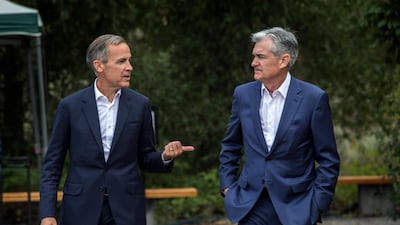It would take years to put compliance and regulatory structures in place to develop an electronic currency with the potential to challenge the dominance of the US dollar as the world's preferred reserve currency, analysts say.
The dollar is likely to reign supreme in the short-term despite trade tiffs dampening the global economic outlook and stoking fears of a possible currency war between the world’s two biggest economies – the US and China. While central banks are stuck in a low interest rate environment, policymakers have begun suggesting radical ideas to tackle their fiscal challenges.
Last week, Bank of England governor Mark Carney said the world’s reliance on the US dollar “won’t hold” and should be replaced by a new international monetary and financial system.
Speaking at an annual gathering of central bankers at Jackson Hole, Wyoming, in the United States, Mr Carney made the case for a global electronic currency that could act as “synthetic hegemonic currency . . . perhaps through a network of central bank digital currencies”.
However, the launch of a true, globally accepted digital currency could take many years.
“Technically, it is feasible. The big question marks are the compliance to global financial regulatory legislations. It is still uncharted territory,” Hans Fraikin, chief executive of Libra Project, a clean tech impact investor that offers digital securities from its bases in Abu Dhabi Global Market and Wyoming, said.
The whole idea of global digital currency, he said, is that it can be traded and is truly “borderless”. However, with every country in the world having to legislate and approve compliance, it is not a project for next year.
“We are not looking at 2020. I can’t see the legislators around the world acting that quickly,” Mr Fraikin notes.
Vijay Valecha, chief investment officer at Dubai-based Century Financial sees an even longer time horizon, arguing that the systems required could take "seven or eight years” and even longer for the currency to become globally acceptable.
Leon Smith, chief executive of DEX, a company which has an in-principle approval to operate a crypto asset exchange at Abu Dhabi Global Markets, agreed.
However, he argued that in the jurisdictions that are “more progressive", this timeline could be much shorter.
Movements in the US dollar are fundamentally important to other economies, even if they have few direct trade links with the US. It accounts for only 10 per cent of global trade and 15 per cent of global gross domestic product, but generates half of trade invoices and two-thirds of global securities issuance, Mr Carney noted in his speech at the Jackson Hole conference, which was centred on the theme of challenges of monetary policy.
Countries are forced to self-insure and hoard dollars to guard against potential capital flight, leading to excess savings and lower global growth, he said.
Though he did not elaborate, Facebook’s Libra comes closest to the digital currency Mr Carney described. The digital token - set to be rolled out next year and secured against a basket of reserve-backed currencies - would not be controlled by Facebook, but run by a consortium that includes Uber, Mastercard, Stripe, Visa, PayPal and Spotify, among others.
Libra, or a token which JP Morgan plans to launch, could “carry the mantle of a global cryptocurrency which Mr Carney is talking about”, said Mr Valecha.
Yet how effective that currency will be in breaking the dominance of the US dollar on global level is a point of debate, Mr Valecha said.
“The JP Morgan coin or Libra is not going to make much of a difference in what Mark Carney is trying to say. It will be a tough task [to break the dollar’s dominance],” he said.
Things could change however, if China proceeds with plans to bring its own virtual currency to the market, especially if it floats freely and is able to be traded globally, he added.
“The only way a digital currency for global trade can come in if China tries to make its own currency in a free float market. China is biggest trade partner to every country in the world,” he said.


